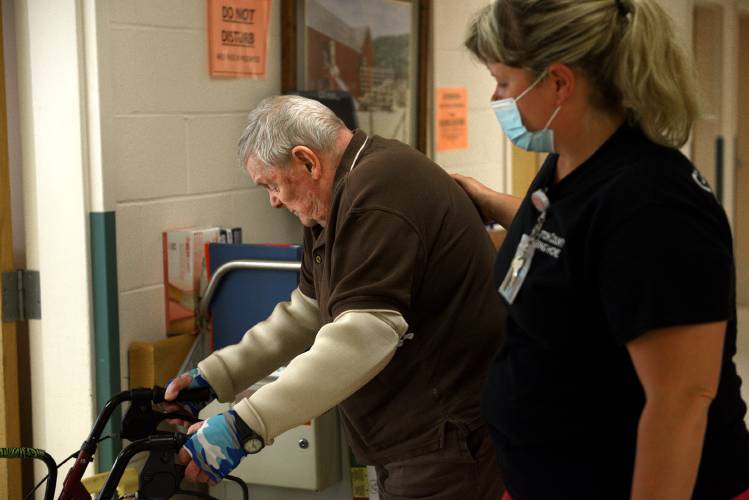Opinion: The long-term care sector’s workforce needs sustainable solutions, not blanket mandates

Licensed nursing assistant Raylynn Taylor assists Grafton County Nursing Home resident Paul Pinkham, 86, down the hall on Thursday, Sept. 14, 2023, in North Haverhill. Jennifer Hauck/ Valley News
|
By DEBRA SHACKETT, ROSS CUNNINGHAM, RAY BOWER, and JULIE LIBBY |
Published: 03-02-2024 8:00 AM |
This My Turn is written by a group of NH county administrators, commissioners and nursing home administrators including Debra Shackett, Belknap County; Ross Cunningham, Merrimack County; Ray Bower, Strafford County; Julie Libby, Grafton County; Chris Coates, Cheshire County; Kathryn Kindopp, Grafton County; Brian Chirichiello, Kate Coyle and Steven Goddu, Rockingham County Commissioners; Richard Leboeuf, Nursing Home Administrator, Carroll County.
New Hampshire is a haven for seniors, and with that comes the increased demand for the long-term care services provided by our 10 counties. New Hampshire’s nursing homes are facing an unprecedented labor crisis which has been further exacerbated as a result of the pandemic, and the supply of skilled workers is not keeping pace with the uptick in demand.
According to recent data, more than 43 percent of long-term care facilities need more nurses or aides. The situation is so dire that several of our facilities are operating at reduced capacity despite having hundreds of individuals on the waitlist.
Against this backdrop, a new complication has arisen. The Biden administration has proposed an unfunded federal staffing mandate for nursing homes as an answer for staffing shortages. Nursing homes that can’t meet the arbitrary ratios would be fined. While this proposal may be well-intended, it won’t deliver the desired outcomes. In fact, it will only worsen staffing challenges and hurt seniors’ access to care in New Hampshire.
Thankfully, New Hampshire’s entire federal delegation —Sen. Shaheen, Sen. Hassan, Congresswoman Kuster and Congressman Pappas — have been voicing their concerns, and highlighting the ramifications of this mandate and the devastating effect it would have on nursing homes throughout the state of New Hampshire.
As leaders within the New Hampshire counties, we would like to publicly thank our federal delegation for their support and encourage them to keep fighting against blanket mandates that will compromise our limited capacity to deliver adequate care to New Hampshire citizens.
This mandate would require hiring thousands more workers. Nursing home providers want more than anything to fill their facilities with a strong army of caregivers and are doing everything they can to do so, but the reality is that the number of workers we need aren’t available in the current labor market. Obstacles include the overall lack of interested or qualified candidates.
Not only are our nursing homes and assisted living communities competing for a finite pool of qualified and available workers, but they are also competing against other healthcare facilities, such as hospitals and physicians’ offices. These are tough competitors because of better wages and benefits. Meanwhile, nursing homes are chronically underfunded, which leaves them with limited resources to meaningfully invest in their workforce.
Article continues after...
Yesterday's Most Read Articles
 Webster seized and sold his house for back taxes. Now the town has agreed to pay him $38,000
Webster seized and sold his house for back taxes. Now the town has agreed to pay him $38,000
 City considers proposal for sanctioned homeless encampment
City considers proposal for sanctioned homeless encampment
 Hillclimbs, nightlife and cruising: Enthusiasts flock to 102nd Laconia Motorcycle Week
Hillclimbs, nightlife and cruising: Enthusiasts flock to 102nd Laconia Motorcycle Week
 A Webster property was sold for unpaid taxes in 2021. Now, the former owner wants his money back
A Webster property was sold for unpaid taxes in 2021. Now, the former owner wants his money back
 ‘The rug pulled out from under me’: For certain police and firefighters, last-minute changes to retirement deal breeds distrust
‘The rug pulled out from under me’: For certain police and firefighters, last-minute changes to retirement deal breeds distrust
 Preparing to say ‘I do’ – Inside the love story taking center stage at Market Days
Preparing to say ‘I do’ – Inside the love story taking center stage at Market Days
If this mandate goes into effect, it will hurt New Hampshire seniors’ access to care. Blanket solutions are not ideal in complex industries. A staffing mandate like the one being proposed would be an impossible standard to meet in the current labor market. This could ultimately force some county facilities to continue limiting the number of residents that they are able to accept, adding hundreds more eligible seniors to the already lengthy waitlists around our state.
The key to solving this problem is recognizing the unique challenges faced by each facility and tailoring strategies to meet their needs. What might work for a large, urban facility may not work for a smaller rural one. Instead of forcing rigid mandates, we need federal policymakers to implement flexible, supportive approaches.
For example, incentivizing workers through training programs, scholarships and grants specific to the long-term care industry could be an excellent solution to the problem of attracting new talent to the field. Additionally, easing the process for foreign-born nurses to come to the U.S. to work could help alleviate shortages in the short and long term.
Workforce challenges demand immediate attention in the form of creative, nuanced solutions rather than an unfunded regulation that will only hurt our seniors. We are encouraged that Sen. Shaheen and Hassan, Congresswoman Kuster and Congressman Pappas have recognized the problems with this proposal and have voiced their concerns. We commend them for taking the lead on crafting policies that will protect access to care and keep New Hampshire a haven for our elderly population.







 Opinion: There’s no place like firearms-free zones
Opinion: There’s no place like firearms-free zones Opinion: Outlines of a new dystopia
Opinion: Outlines of a new dystopia Opinion: Speechless in America no more
Opinion: Speechless in America no more Opinion: Friends don’t let friends drive drunk
Opinion: Friends don’t let friends drive drunk
